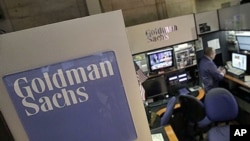A senior executive at the powerful Wall Street investment firm Goldman Sachs resigned this week, saying the organization now values its own profits more than the interests of its clients. An examination of the financial and ethical implications of the charges reveals more about the situation and how some say the banking giant operates.
Greg Smith gave up his position at Goldman Sachs in London as executive director of the firm’s U.S. equity derivatives business in Europe, the Middle East and Africa. His resignation after 12 years with the firm was accompanied by an op-ed piece in The New York Times in which he wrote that the firm’s current environment was never as toxic and destructive as it is now. He alleges that junior analysts reflect the Goldman Sachs leaders by seeking maximum profits for the institution, even if it means intentionally selling the wrong financial products to clients.
Brokers at other investment firms say Smith’s charges could damage them, as well.
“The question, of course, is, is this isolated to just Goldman Sachs? Almost certainly not. I'm sure this sort of thing happens across the banking sector as a whole, and other investment banks as well. It's not good PR,” said Angus Campbell, head of sales at the London Capital Group.
More Wall Street fallout
Goldman Sachs CEO Lloyd Blankfein characterized Smith’s charges as those of a disgruntled employee. The firm also issued a statement saying, "We disagree with the views expressed, which we don't think reflect the way we run our business. In our view, we will only be successful if our clients are successful. This fundamental truth lies at the heart of how we conduct ourselves."
Smith’s charges come at a time of widespread public resentment over Wall Street’s alleged role in the 2008 financial crisis and subsequent government bailout of major banks. William Cohan, author of a book entitled How Goldman Sachs Came to Rule the World, said the public is not likely to change its negative view of Wall Street.
“The reason nothing has changed on Wall Street is because the incentives on Wall Street have not changed,” said Cohan.
Jason Thomas, a former Goldman Sachs associate and now Chief Investment Officer for the Aspiriant wealth management firm in Los Angeles, said the incentives include money, power, and prestige. He said the culture at Goldman Sachs changed when the firm began selling shares to the public in 1999.
Charges of culture of greed
“There’s the pressure to meet quarterly earnings and I think that is in some ways the most devastating aspect of being a public company - it’s having that scrutiny and the inability to look long term to make long-term decisions,” said Thomas.
Smith writes that Goldman Sachs had previously promoted a culture of integrity, humility and trust to always do right by clients. Thomas agreed. He added that junior employees were constantly reminded that they could do more damage to the firm in a day than they could bring it benefit.
“So in other words, don’t go reaching and stretching and pushing the boundaries, because there’s a lot more upside than downside for the firm, and that sort of got lost, evidently, somewhere along the way,” said Thomas.
Smith alleges that the decline in the moral fiber of Goldman Sachs presents the single most serious threat to its long-term survival. Thomas said Smith’s revelations could result in a period of soul-searching at the firm, which was founded in 1869.
News
Goldman Sachs Culture Assailed




